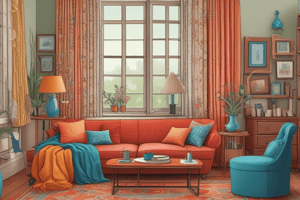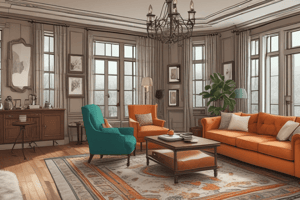Podcast
Questions and Answers
What is the primary focus of an interior decorator?
What is the primary focus of an interior decorator?
- Designing outdoor environments and landscapes
- Implementing architectural plans and designs
- Focusing on the aesthetics and functionality of indoor spaces (correct)
- Enhancing the structural integrity of buildings
Which factor is NOT typically considered by interior decorators when designing a space?
Which factor is NOT typically considered by interior decorators when designing a space?
- Furniture selection
- Spatial arrangement
- Color schemes
- Traffic flow (correct)
How do interior decorators optimize the layout of a room?
How do interior decorators optimize the layout of a room?
- By increasing the structural weight capacity
- By designing the building's foundation
- By assessing air ventilation systems
- By maximizing space utilization and creating focal points (correct)
What distinguishes interior design from interior decorating?
What distinguishes interior design from interior decorating?
In what types of spaces do interior decorators commonly work?
In what types of spaces do interior decorators commonly work?
What is one of the main responsibilities of an interior decorator?
What is one of the main responsibilities of an interior decorator?
Which task is part of the interior decorating process?
Which task is part of the interior decorating process?
What distinguishes an interior designer from an interior decorator?
What distinguishes an interior designer from an interior decorator?
What is NOT a category typically associated with interior decorating?
What is NOT a category typically associated with interior decorating?
Which of the following statements about becoming an interior decorator is true?
Which of the following statements about becoming an interior decorator is true?
Which type of window covering style closes from top to bottom?
Which type of window covering style closes from top to bottom?
What is a defining characteristic of sheers used in window treatments?
What is a defining characteristic of sheers used in window treatments?
Which decorative accent is used to enhance the look of windows?
Which decorative accent is used to enhance the look of windows?
What material is typically used for shutters in window treatments?
What material is typically used for shutters in window treatments?
Which type of blinds offers options like Venetian and mini styles?
Which type of blinds offers options like Venetian and mini styles?
Flashcards are hidden until you start studying
Study Notes
Interior Decorating vs. Interior Design
- Interior decorating enhances aesthetics, comfort, and functionality of indoor spaces primarily focusing on residential areas but can also include commercial settings like boutiques and restaurants.
- Key responsibilities include transforming interiors by selecting color schemes, furniture, and spatial arrangements to create visually appealing environments.
- Interior decorators optimize layouts using artistic skills and design principles to maximize space utilization and highlight specific areas.
- Collaboration with clients is essential to understand preferences and tailor designs according to individual tastes and needs.
- Interior design goes beyond aesthetics, encompassing structural and functional aspects like traffic flow, lighting, and acoustics for practical and efficient spaces.
Key Elements in Interior Decorating
- Color Palettes: Various schemes that shape the mood and style of a space.
- Furnishings: Selection of furniture and decor items that enhance visual appeal.
- Paint and Wall Coverings: Includes diverse color options and wallpapers for walls.
- Window Treatments: Use of curtains, blinds, and shades to control light and privacy.
- Textiles: Fabrics utilized for upholstery and drapery, adding texture and warmth.
- Flooring and Rugs: Different types of flooring materials and rug styles contribute to room function.
- Illumination: Importance of lighting fixtures in setting ambiance.
- Artifacts: Decorative items like art pieces that personalize a space.
- Flora: Incorporation of plants and flowers to enhance livability.
Responsibilities and Tasks of Interior Decorators
- Consulting with clients to understand their desires and requirements for decoration projects.
- Assessing the designated area to create tailored room design plans.
- Obtaining cost estimates and showing color swatches and fabrics to clients for informed decisions.
- Planning project timelines and organizing tasks to ensure smooth execution.
- Overseeing activities such as painting, wallpapering, and flooring installation.
- Purchasing and arranging furnishings while managing delivery schedules to complete the decorating scheme.
Career Path and Education in Interior Decorating
- There are no formal educational requirements to become an interior decorator; one can claim the title upon starting work in the field.
- Resources for self-education are vital for those unfamiliar with aspects of interior decorating.
- Opportunities exist for securing full-time employment or establishing an independent decorating business.
- The career path for interior design generally involves more stringent qualifications and education compared to decorating.
Importance of Window Coverings
- Enhance aesthetics and functionality of interior spaces.
- Contribute to texture, color scheme, and visual appeal.
- Serve practical purposes such as privacy and natural light control.
Factors to Consider When Selecting Window Coverings
- Level of privacy needed.
- Required functionality (e.g., light filtering or room darkening).
- Style that complements overall decor.
- Desired amount of natural light.
Types of Window Treatments
-
Curtains:
- Hung on a rod, manually operated.
- Can be casual or formal, lined or unlined, ready-made or custom.
-
Drapes:
- Operated via pulley cord system, offer a formal look.
- Typically extend to the floor for dramatic effect, available in pleated, tabbed, or smocked styles.
-
Blinds:
- Available in Venetian, mini, vertical, and matchstick styles.
- Provide versatile light control and privacy options.
-
Shades:
- Close from top to bottom, made from various fabrics.
- Styles include Roman, Festoon, and Pleated, featuring unique designs.
-
Sheers:
- Made from translucent fabrics for an airy, delicate appearance.
-
Shutters:
- Wooden panels or slats, offering a casual aesthetic.
-
Decorative Accents:
- Include tie backs, decorative rods, sconces, valances, and cornices, enhancing window aesthetics.
Aesthetic and Functional Considerations
- Selection involves balancing practical needs with stylish preferences.
- Abundant choices in color, fabric, and texture allow for tailored window coverings.
- Final decision should reflect desired aesthetic and functional requirements of the space.
Studying That Suits You
Use AI to generate personalized quizzes and flashcards to suit your learning preferences.




